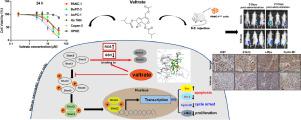Phytomedicine ( IF 6.7 ) Pub Date : 2021-03-03 , DOI: 10.1016/j.phymed.2021.153537 Liping Chen , Di Feng , Yafang Qian , Xiao Cheng , Huizhu Song , Yifan Qian , Xu Zhang , Yali Wu , Huawei Lv , Qi Liu , Gang Cheng , Bo Yang , Mancang Gu

|
Background
Valtrate is a novel epoxy iridoid ester isolated from Chinese herbal medicine Valeriana jatamansi Jones with anti-proliferative activity against various human cancer cell lines. However, its efficacy and molecular mechanisms against pancreatic cancer (PC) cells are largely unclear.
Purpose
To investigate the anti-cancer effects of valtrate on PC cell lines and its underlying mechanisms.
Methods
MTT assay was first performed to detect the effect of valtrate on cell viability in human PC cell lines and normal pancreatic epithelial cells HPDE. Cell apoptosis and cycle phase assay were detected by flow cytometry. The relative mRNA expressions of Bax, Bcl-2, c-Myc, and CyclinB1 were tested by quantitative PCR (qPCR) assay. The expression of relative proteins was detected by Western blotting (WB). A PANC-1luc cells xenograft mouse model in nu/nu female mice was used to elucidate the effect of valtrate on tumor growth in vivo.
Results
Valtrate significantly inhibited the growth of PC cells without affecting the growth of normal pancreatic epithelial cells HPDE, induced significant apoptosis and cell cycle arrest in G2/M phase. Moreover, valtrate inhibited the tumor growth of PC cell PANC-1 in xenograft mice by 61%. Further mechanism study demonstrated that valtrate could increase the expression level of Bax, suppress Bcl-2 as well as c-Myc and Cyclin B1, inhibit the transcriptional activity of Stat3, while valtrate decreased the expression level of Stat3 and phosphated-Stat3 (Tyr705) and induced the high molecular aggregation of Stat3. Molecular docking analysis predicted that valtrate might interact with Cys712 of Stat3 protein. Valtrate could also induce a transient depleted intracellular glutathione (GSH) level and increased reactive oxygen species (ROS). NAC (N-acetylcysteine), a reducer reversed valtrate-induced the depletion of Stat3, p-Stat3, c-Myc, and Cyclin B1.
Conclusion
Valtrate exerts anti-cancer activity against PC cells by directly targeting Stat3 through a covalent linkage to inhibit Stat3 activity, which causes apoptosis and cell cycle arrest.
中文翻译:

Valtrate作为一种新型治疗剂,可通过抑制Stat3信号传导来发挥有效的抗胰腺癌活性
背景
Valtrate是从中草药缬草缬草中分离出来的一种新型环氧环烯醚草酸酯,对多种人类癌细胞系具有抗增殖活性。但是,其针对胰腺癌细胞(PC)的功效和分子机制尚不清楚。
目的
研究戊酸对PC细胞系的抗癌作用及其潜在机制。
方法
首先进行MTT测定以检测戊酸对人PC细胞系和正常胰腺上皮细胞HPDE中细胞活力的影响。通过流式细胞术检测细胞凋亡和周期相测定。通过定量PCR(qPCR)检测了Bax,Bcl-2,c-Myc和CyclinB1的相对mRNA表达。通过蛋白质印迹法(WB)检测相对蛋白的表达。用nu / nu雌性小鼠PANC-1 luc细胞异种移植小鼠模型阐明valtrate对体内肿瘤生长的影响。
结果
Valtrate显着抑制PC细胞的生长,而又不影响正常胰腺上皮细胞HPDE的生长,在G2 / M期诱导明显的细胞凋亡和细胞周期停滞。此外,valtrate抑制异种移植小鼠PC细胞PANC-1的肿瘤生长达61%。进一步的机制研究表明,valtrate可以增加Bax的表达水平,抑制Bcl-2以及c-Myc和Cyclin B1,抑制Stat3的转录活性,而valtrate可以降低Stat3和磷酸化Stat3的表达水平(Tyr705)并引起Stat3的高分子聚集。分子对接分析预测,戊二酸酯可能与Stat3蛋白的Cys712相互作用。戊二酸酯还可能诱导细胞内谷胱甘肽(GSH)的短暂消耗和活性氧(ROS)的增加。
结论
Valtrate通过共价键直接靶向Stat3以抑制Stat3活性,从而对细胞产生抗癌活性,从而抑制Stat3的活性,从而导致细胞凋亡和细胞周期停滞。






























 京公网安备 11010802027423号
京公网安备 11010802027423号